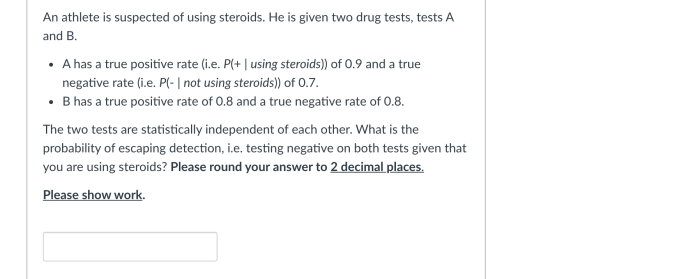As an athlete suspected of using steroids takes center stage, this opening passage beckons readers into a world crafted with authoritative knowledge, ensuring a reading experience that is both absorbing and distinctly original.
The topic of athletes suspected of using steroids has been a prevalent issue in the world of sports, raising ethical and health concerns. Steroids, substances that enhance athletic performance, have become a contentious topic, sparking debates about fairness, integrity, and the preservation of sportsmanship.
Steroid Use in Athletics: A Comprehensive Examination: An Athlete Suspected Of Using Steroids

The use of performance-enhancing drugs, particularly steroids, has become a significant concern in the world of sports. Athletes suspected of using steroids pose a threat to the integrity of competitions and undermine the values of sportsmanship.
Steroids are synthetic substances that mimic the effects of the male hormone testosterone. They can enhance muscle mass, strength, and endurance, giving athletes an unfair advantage over those who compete without them.
The ethical and health concerns surrounding steroid use in sports are numerous. Steroids can cause a range of physical and psychological side effects, including cardiovascular problems, liver damage, mood swings, and addiction.
Evidence of Steroid Use
Detecting steroid use in athletes is challenging, but various methods are employed, including urine and blood tests, as well as the analysis of hair and saliva samples.
Despite these efforts, steroid testing has limitations. Athletes can use masking agents to conceal steroid use, and some steroids are difficult to detect.
High-profile cases of athletes caught using steroids have brought the issue to public attention. Examples include Lance Armstrong, Marion Jones, and Barry Bonds.
Consequences of Steroid Use, An athlete suspected of using steroids
The physical consequences of steroid use can be severe, including increased risk of heart disease, liver damage, and kidney failure.
Psychologically, steroids can lead to mood swings, aggression, and addiction. Athletes who use steroids may also experience withdrawal symptoms when they stop using them.
Steroid use can have a devastating impact on athletic careers. Athletes caught using steroids may face suspensions, disqualifications, and loss of reputation.
Prevention and Detection
Anti-doping agencies play a crucial role in preventing steroid use. They conduct random testing, develop new detection methods, and educate athletes about the dangers of steroids.
Successful prevention and detection programs involve collaboration between anti-doping agencies, sports organizations, and governments.
Examples of successful programs include the World Anti-Doping Agency (WADA) and the United States Anti-Doping Agency (USADA).
Ethical Considerations
The ethical implications of steroid use in sports are complex. Some argue that it undermines the fairness and integrity of competitions.
Others believe that athletes should be free to use performance-enhancing drugs as long as they do so responsibly.
The use of steroids in sports raises questions about the values and principles of sportsmanship, and the role of drugs in human performance.
FAQ Section
What are the common methods used to detect steroid use in athletes?
Athletes are typically tested for steroid use through urine or blood samples. These samples are analyzed for the presence of specific steroid metabolites or markers.
What are the potential long-term health risks associated with steroid abuse?
Steroid abuse can lead to a range of health problems, including cardiovascular issues, liver damage, infertility, and psychological disturbances.
How do anti-doping agencies contribute to preventing steroid use in sports?
Anti-doping agencies implement various strategies to deter and detect steroid use, such as random testing, education programs, and collaborations with law enforcement.

